Papers by Andrew Whitehead
Skip to Main Content. ...

Punishment & Society, 2019
Prior research demonstrates that multiple dimensions of religiosity significantly predict punitiv... more Prior research demonstrates that multiple dimensions of religiosity significantly predict punitive attitudes and militarism. This study highlights the importance of believing in a masculine God, an aspect of religiosity with a robust and consistent relationship to punitiveness and militarism, but which has previously been unexamined. After accounting for multiple aspects of religiosity highlighted by previous research-such as frequency of religious practice, religious tradition, fundamentalist identity and beliefs, and other dimensions of God image including love, anger, judgment, and engagement-believing that God is a "He" consistently and strongly increases support for harsh social policies targeting intra-societal enemies (criminals), as well as general militarism and campaigns targeting extra-societal enemies (e.g., "terrorists"). These results highlight the importance of theorizing and measuring gendered dimensions of belief in God, as well as the importance of fine-grained considerations of religion in studies of penal populism and militarism.
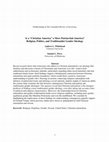
The Canadian Review of Sociology
Recent research shows that Americans who adhere to Christian nationalism―an ideology that idealiz... more Recent research shows that Americans who adhere to Christian nationalism―an ideology that idealizes and advocates a fusion of Christianity and American civic life―tend to hold authoritarian and exclusionary attitudes, particularly regarding ethno-racial minorities and non-traditional family forms. Such findings suggest a fundamental connection between Christian nationalism and rigid symbolic boundaries, which would likely extend to Americans’ understanding of gender roles. Drawing on notions connecting religious nationalism with defenses of patriarchal norms and utilizing a recent national, random sample of American adults, the current study examines the link between contemporary Christian nationalism and traditionalist gender ideologies. Our analyses reveal that Christian nationalism is the strongest predictor of holding a more traditionalist gender ideology, even after taking into account a host of political and religious characteristics. Moreover, the relationship between Christian nationalism and gender traditionalism holds across religious traditions, including more gender-egalitarian groups like Mainline Protestants and even the unaffiliated. We conclude by highlighting the implications of these findings for understanding contemporary populist support for Donald Trump, which previous studies have shown is undergirded by both Christian nationalism and sexism.
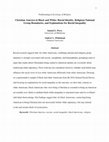
Recent research suggests that, for white Americans, conflating national and religious group ident... more Recent research suggests that, for white Americans, conflating national and religious group identities is strongly associated with racism, xenophobia, and Islamophobia, prompting some to argue that claims about Christianity being central to American identity are essentially about reinforcing white supremacy. Prior work has not considered, however, whether such beliefs may influence the racial views of non-white Americans differently from white Americans. Drawing on a representative sample of black and white Americans from the 2014 General Social Survey, and focusing on explanations for racial inequality as the outcome, we show that, contrary to white Americans, black Americans who view being a Christian as essential to being an American are actually more likely to attribute black-white inequality to structural issues and less to blacks' individual shortcomings. Our findings suggest that, for black Americans, connecting being American to being Christian does not necessarily bolster white supremacy, but may instead evoke and sustain ideals of racial justice.
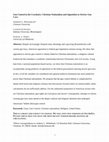
Despite increasingly frequent mass shootings and a growing dissatisfaction with current gun laws,... more Despite increasingly frequent mass shootings and a growing dissatisfaction with current gun laws, American opposition to federal gun legislation remains strong. We show that opposition to stricter gun control is closely linked to Christian nationalism, a religious cultural framework that mandates a symbiotic relationship between Christianity and civil society. Using data from a national population-based survey, we show that Christian nationalism is an exceptionally strong predictor of opposition to the federal government enacting stricter gun laws. In fact, of all the variables we considered only general political orientation has more predictive power than Christian nationalism. We propose that the gun control debate is complicated by deeply held moral and religious schemas that discussions focused solely on rational public safety calculations do not sufficiently address. For the substantial proportion of American society who are Christian nationalists, gun rights are God-given and sacred. Consequently, attempts to reform existing gun laws must attend to the deeper cultural and religious identities that undergird Americans' beliefs about gun control.

Prior research consistently demonstrates greater religious involvement is associated with improve... more Prior research consistently demonstrates greater religious involvement is associated with improved health outcomes for those with chronic health conditions. Fewer studies focus on how chronic health conditions influence religious service attendance rates and most focus on older Americans. Using three waves of a nationally representative sample of children in the United States, I test whether children with a chronic health condition never attend religious worship services at rates significantly higher than children without a condition. I also investigate variation in attendance rates across a broad range of conditions, something previously overlooked. Children with chronic health conditions are more likely to never attend religious worship services. Specifically, children with chronic health conditions that impede communication and social interaction are most likely to never attend. Despite shifts in prevalence these findings are stable over time. Implications for researchers, religious communities, families with children with chronic health conditions, and healthcare providers are discussed.
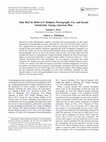
Research has often demonstrated a negative association between pornography use and various intrap... more Research has often demonstrated a negative association between pornography use and various intrapersonal and relationship outcomes, particularly for men. Several recent studies, however, have suggested that the negative association between pornography use and these indicators is stronger among more religious Americans, suggesting that moral incongruence (engaging in an activity that violates one's sacred values) and the attendant shame or cognitive dissonance, rather than the pornography use per se, may be the primary factor at work. The current study tested and extended this theory by examining how religion potentially moderates the link between pornography use and sexual satisfaction in a national random sample of American adults (N=1,501). Analyses demonstrated that, while pornography use was negatively associated with sexual satisfaction for American men (not women), among men who rarely attended religious services or held a low opinion of the Bible, this negative association essentially disappeared. Conversely, the negative association between frequency of pornography consumption and sexual satisfaction was more pronounced for men with stronger ties to conventional religion. These findings suggest that the connection between pornography use and sexual satisfaction, especially for men, depends largely on what viewing pornography means to the consumer and their moral community, and less so on the practice itself.

Why did Americans vote for Donald Trump in the 2016 Presidential election? Social scientists have... more Why did Americans vote for Donald Trump in the 2016 Presidential election? Social scientists have proposed a variety of explanations, including economic dissatisfaction, sexism, racism, Islamophobia, and xenophobia. The current study establishes that, independent of these influences, voting for Trump was, at least for many Americans, a symbolic defense of the United States' perceived Christian heritage. Data from a national probability sample of Americans surveyed soon after the 2016 election shows that greater adherence to Christian nationalist ideology was a robust predictor of voting for Trump, even after controlling for economic dissatisfaction, sexism, anti-black prejudice, anti-Muslim refugee attitudes, and anti-immigrant sentiment, as well as measures of religion, sociodemographics, and political identity more generally. These findings indicate that Christian nationalist ideology—although correlated with a variety of class-based, sexist, racist, and ethnocentric views—is not synonymous with, reducible to, or strictly epiphenomenal of such views. Rather, Christian nationalism operates as a unique and independent ideology that can influence political actions by calling forth a defense of mythological narratives about America's distinctively Christian heritage and future.

Why did Americans vote for Donald Trump in the 2016 Presidential election? Social scientists have... more Why did Americans vote for Donald Trump in the 2016 Presidential election? Social scientists have proposed a variety of explanations, including economic dissatisfaction, sexism, racism, Islamophobia, and xenophobia. The current study establishes that, independent of these influences, voting for Trump was, at least for many Americans, a symbolic defense of the United States' perceived Christian heritage. Data from a national probability sample of Americans surveyed soon after the 2016 election shows that greater adherence to Christian nationalist ideology was a robust predictor of voting for Trump, even after controlling for economic dissatisfaction, sexism, anti-black prejudice, anti-Muslim refugee attitudes, and anti-immigrant sentiment, as well as measures of religion, sociodemographics, and political identity more generally. These findings indicate that Christian nationalist ideology—although correlated with a variety of class-based, sexist, racist, and ethnocentric views—is not synonymous with, reducible to, or strictly epiphenomenal of such views. Rather, Christian nationalism operates as a unique and independent ideology that can influence political actions by calling forth a defense of mythological narratives about America's distinctively Christian heritage and future.

Religious identity, and specifically Christian identity, has long been a dominant symbolic bounda... more Religious identity, and specifically Christian identity, has long been a dominant symbolic boundary marker for inclusion into American society. But how has the salience of this boundary marker changed in recent years and in comparison to other boundary markers? Using multiple waves of the General Social Survey (1996, 2004, and 2014), we investigate temporal variation in the use of religion and other markers in constructing symbolic boundaries around American identity. First, we find that the Christian symbolic boundary both increased from 1996 to 2004 and declined from 2004 to 2014. Second, this pattern was not unique; in addition to the Christian symbolic boundary, Americans used a variety of both civic and ascriptive boundary markers in order to define American identity. However, our analysis also demonstrates that in 2004 the Christian symbolic boundary was significantly linked to national identity in a unique way while the other boundary markers were not. These results suggest that period effects and cultural events can influence the salience of religion in creating national symbolic boundaries. We discuss each of these findings, their relationship to the study of symbolic boundaries and American identity, and their societal implications.
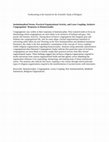
Congregations vary widely in their responses to homosexuality. Prior research tends to focus on d... more Congregations vary widely in their responses to homosexuality. Prior research tends to focus on determining which congregations are most likely to be inclusive of lesbians and gays. One puzzle still remains, however. Among those inclusive congregations that integrate gays and lesbians into congregational life, why do some adopt a formal organizational statement of welcoming while others do not? Drawing on the New Institutionalism and inhabited institutions literatures, this study is the first quantitative examination of the concept of " loose coupling " within religious organizations regarding homosexuality. Analyses using nationally representative congregational data (National Congregations Study) indicate that particular types of inclusive congregations are more likely to loosely couple their practical activity from their formal organizational stance. These findings suggest that inclusive religious organizations respond to myths and norms from various organizational fields and that agentic actors inhabiting the organization influence it by responding, interpreting, and making sense of those institutional norms. The analyses also indicate that loose coupling is one avenue through which particular types of religious organizations respond to the transformation of societal norms with innovation.
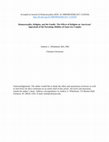
While a growing body of research focuses on Americans’ attitudes toward same-sex couples as paren... more While a growing body of research focuses on Americans’ attitudes toward same-sex couples as parents, very few include measures of religion and those that do fail to capture its multidimensional nature. Furthermore, many past studies rely on convenience samples of college students, or samples gathered outside the United States. Multivariate analyses of the 2012 General Social Survey – a nationally representative sample of adults in the United States – reveal that a slim majority of Americans still do not believe same-sex couples can parent as well as male-female couples and the religious beliefs, behaviors, and affiliations of Americans are significantly and at times differentially associated with appraisals of same-sex couples’ parenting abilities. It appears that while religion is generally associated with more negative appraisals of the parenting abilities of same-sex couples, it is not uniformly so. Americans’ immediate religious and cultural context can shape their appraisals of homosexuality in diverse ways.

While the link between individual religious characteristics and pornography consumption is well e... more While the link between individual religious characteristics and pornography consumption is well established, relatively little research has considered how the wider religious context may influence pornography use. Exceptions in the literature to date have relied on relatively broad, subjective measures of religious commitment, largely ignoring issues of religious belonging, belief, or practice. This study moves the conversation forward by examining how a variety of state-level religious factors predict Google searches for the term " porn, " net of relevant sociodemographic and ideological controls. Our multivariate findings indicate that higher percentages of evangelical Protestants, theists, and Biblical literalists in a state predict higher frequencies of searching for " porn, " as do higher church attendance rates. Conversely, higher percentages of religiously unaffiliated persons in a state predict lower frequencies of searching for " porn. " Higher percentages of total religious adherents, Catholics, or Mainline Protestants in a state are unrelated to searching for " porn " with controls in place. Contrary to recent research, our analyses also show that higher percentages of political conservatives in a state predicted lower frequencies of " porn " searches. Our findings support theories that more salient, traditional religious influences in a state may influence residents—whether religious or not—toward more covert sexual experiences.

Despite the growing literature focusing on the ways gender ideology influences heterosexual relat... more Despite the growing literature focusing on the ways gender ideology influences heterosexual relationship outcomes, few of these studies have considered the moderating role of religion. Drawing on a national random sample of American adults who report being married or living as married we focus on relationship satisfaction. Specifically, we examine the extent to which religious commitment moderates the link between gender ideology and reported relationship satisfaction and whether this moderating effect varies across gender. In the main effects, gender traditionalism is negatively associated with relationship satisfaction. However, interaction effects reveal that religious commitment moderates the effects of gender ideology such that the negative effects of gender traditionalism on relationship satisfaction only apply to those who are less religious. Gender traditionalism, by contrast, is not negatively related to relationship satisfaction for the highly-religious. Splitting the sample by gender reveals that this moderating relationship is only significant for women. Thus, while gender traditionalism, in the main, is negatively related to relationship satisfaction, this effect is contingent on both gender and religious commitment. Religious commitment, for various reasons we discuss, appears to mitigate negative effects of gender traditionalism on relationship outcomes, and particularly for American women.

Mothers of children with autism spectrum disorders (ASD) typically report lower overall family fu... more Mothers of children with autism spectrum disorders (ASD) typically report lower overall family functioning and worse mental health. Neighborhood conditions are found to positively influence family functioning and mental health in the general population. Employing a process-person-context model, this study extends these literatures to examine whether various neighborhood conditions – both positive and negative – affect mothers’ mental health and the overall functioning of families with a child with an ASD. Simultaneous equation path analysis of a nationally representative sample of children in the US finds neighborhood support to be positively and significantly associated with mothers’ mental health and the overall functioning of families with a child with an ASD. However, neighborhood amenities and neighborhood deficiencies were not significantly associated with either mothers’ mental health or family functioning. Neighborhood support can play a vital role in improved subjective quality of life for mothers with a child on the autism spectrum.

Sociology of Religion, 2011
Large congregations are commonly criticized as eliciting less involvement from adherents than sma... more Large congregations are commonly criticized as eliciting less involvement from adherents than smaller congregations. Small groups have been heralded as a remedy to drawbacks of increasing congregation size. This study tests the relevance of small groups to individuals' commitment and participation, particularly in large congregations. Analysis features the 2001 U.S. Congregational Life Survey and a survey of congregants at one Central Texas Megachurch. Persons involved in small groups devoted to prayer, discussion, or Bible study report a greater sense of belonging, more frequent attendance, and higher rates of giving. The effect of small group involvement does not differ by congregation size, however. From worshippers in one Texas megachurch, we find that the extent of small group involvement positively relates to commitment and participation. Small groups may not completely resolve problems associated with increasing size, but we believe they do represent a potent source of vitality in congregations big and small.

Family forms that have historically been considered “nontraditional” and even “transgressive” are... more Family forms that have historically been considered “nontraditional” and even “transgressive” are becoming increasingly accepted in the United States, bringing the U.S. into greater conformity with other western nations. The U.S. is still unique, however, in that religion continues to play an exceptionally powerful role in shaping Americans’ perceptions of and engagement in nontraditional families. Focusing our attention on same-sex and interracial families specifically, we consider the recent work on how religion serves to stimulate and justify opposition or (in a minority of instances) support for such families. We contend that studies typically limit their focus to the cognitive aspects (beliefs, ideologies, identities, schemas, salience, etc.) of religion, while often ignoring the influence of religion’s more structural aspects in shaping Americans’ relationship to nontraditional families. Given that religion impacts Americans’ approaches to family formation at the micro, meso, and macro levels, we propose a more Durkheimian perspective on the topic, one that synthesizes social psychological and structural frameworks in future studies, thus allowing for a more comprehensive understanding of religion’s evolving role in American family formation. We also call for more attention to how religion shapes the functioning of nontraditional families.











Uploads
Papers by Andrew Whitehead